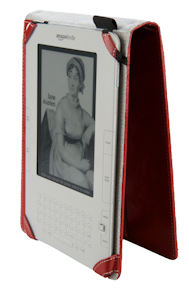The Kindle Screensaver Should Be a Book's Cover Art
Now that I've established my kindle owner bona fides, here's my primary complaint about the Kindle.
To: kindle-feedback@amazon.com Cc: jeff@amazon.com Subject: Kindle Voyage—Use book cover art as screensaver
Hi,
Please give me an official way of allowing me to use my current book's cover art as my Kindle screensaver. If not that, give me a semi-supported way to use 3rd party modifications on my Kindle, so that I can install someone else’s code that will allow me to use my current book's cover art as my Kindle screensaver. I'd prefer a solution directly from Amazon, but if you're unwilling to provide it, I'm willing to look for a solution somewhere else.
Mostly, I love my Kindle Voyage. My biggest complaint is that the Kindle doesn’t have a feature allowing me to use my book’s cover art as the screensaver image. I read. A lot. I think the cover art of each book is an important part of my emotional connection to each book. But the Kindle almost never allows me to see that cover art. I see it when I’m selecting a book from the home screen, and that’s pretty much it. When my Kindle is on, I see the text of the book. When my Kindle is off, I see a random image from a collection of boring stock art screensavers.
In the past, I’ve jailbroken my Kindle devices, just so that I can install a hack that will use the cover art of my current book (or magazine, or personal document) as the screensaver for my device. The Lab126 team has gotten too good at preventing jailbreaks and now I can no longer see book cover art as my screensaver. This is very disappointing and is the biggest thing I don’t like about my new Kindle Voyage.
Thanks, ~Joe
About 24 hours later, I got a form response from the Kindle development team.
I'm sorry; currently the option to set the Kindle book’s cover art as the screensaver image isn't available on Kindle device. It is certainly not our intention for our customers to have anything but a pleasant experience using Kindle.
I completely understand that this feature (To set the Kindle book’s cover art as the screensaver image) definitely would be of great help to our customers. It's unfortunate that this feature is not available right now.
Although at this time there is no option for this, we'll be sure to consider your feedback as we plan for further improvements. Rest assured that I have passed along your comments to our developers. We definitely value your opinion and will continue to listen and respond to our customers' concerns. We will make every effort to evaluate the information you have provided, and try our level best to lead it to program changes or enhancements.
About 24 hours after that, I got a chiding response from one of Bezo's minions.
I'm Elizabeth King of Amazon.com's Executive Customer Relations team. Jeff Bezos received your e-mail and asked me to respond on his behalf. I'll be sure to include Jeff’s office with this correspondence.
Thanks for taking the time to share your feedback on allowing Kindle users to download third party software to devices for custom screen savers.
Customer feedback is very important to us as it allows us to continue to improve the services we provide based on what our customers are looking for. I've forwarded your comments to the Kindle team. In the future, if you'd like to share any thoughts you have about Kindle with the Kindle team directly, please feel free to send them to kindle-feedback@amazon.com.
Please keep in mind we're unable to provide any troubleshooting for your Kindle devices if it appears the device has been rooted.
Please refer to the Kindle License Agreement and Terms of Use for information regarding the proper use of Kindle software:
 Can a simple accessory change your life? I guess it depends on how easily the course of your life is altered. But this
Can a simple accessory change your life? I guess it depends on how easily the course of your life is altered. But this